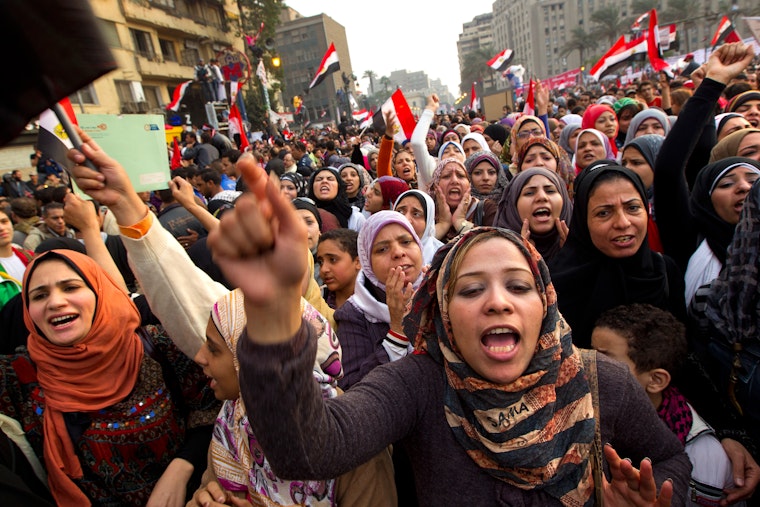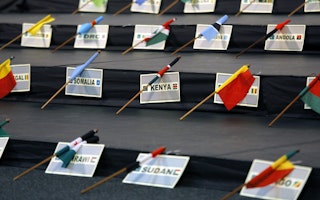African Feminists Mark Women’s Role in Shaping Their Continent’s Future
By Jessica Horn

“The revolution is a woman,” declared Mariam Kirollos to a room of over 160 African feminists, who convened in Harare, Zimbabwe, last month for the fourth African Feminist Forum (AFF).
Kirollos, cofounder of Operation Anti–Sexual Harassment and Assault, an activist group in Cairo, recounted how Egyptian women helped craft and sustain the movement that overthrew the regime of Hosni Mubarak. For their contributions, they faced violence—both during the revolution in targeted physical attacks on women protestors, and under the current government, which has persecuted and imprisoned women’s rights defenders.
Kirollos paused at the microphone as memories of the onslaught came back to her. Rising to meet her distress, a chorus of Southern African women began to sing “Malibongwe igama lamakhosikhazi” (“Let the Name of the Women Be Praised”), a song rooted in the 1956 women’s march against the seat of the apartheid government in Pretoria, South Africa.
It is moments like these that attest to the significance of the African Feminist Forum, a biennial meeting hosted by the African Women’s Development Fund first held in 2006. The AFF allows for political analysis and tactical networking, but also serves as a living archive of African women’s contributions to the struggle for democracy and justice.
From Cape to Cairo, there is a largely undocumented history of African women’s leadership in political and social movements. As noted in the framing document for the AFF, the Charter of Feminist Principles, “Modern African states were built off the backs of African feminists who fought alongside men for the liberation of our continent.” At the AFF, activists have the opportunity to correct the historical record, set plans to keep progressive activism alive, and share the backstory of how movements were built and led, succeeded and faltered.
In Harare, we heard firsthand from young queer feminists who helped create the #FeesMustFall movement in South Africa against race- and class-based exclusion in tertiary education, and from women with disabilities from the Y’en a Marre (“I’ve had enough”) movement in Senegal that prevented President Abdoulaye Wade from securing an unconstitutional third term in office.
National African Feminist Forums in Nigeria and Uganda chronicled their leadership roles in campaigns against homophobic legislation and attempts to censor women’s dress choices, and in building a critical mass of activists to defend principles of choice and bodily autonomy. Ugandan LGBTI rights activist Kasha Jaqueline Nabagesera acknowledged the support of other members of the Uganda Feminist Forum in building a cross-movement front against the increasingly fierce persecution of LGBTI people in that country. And members of the Liberian Feminist Forum told of the catalytic actions of women on the front lines of the Ebola outbreak, mobilizing communities with a reach that extended further than efforts by international humanitarian organizations.
Two common points emerged in the weave of testimonies. The first was the political rigor and inclusiveness of feminists in protest movements. Intersectionality—the understanding of the interrelatedness of oppressions and the struggles to end them—has been central to crafting feminist practices of freedom.
The second was the persistence of antifeminist backlash. In a eulogy to Zimbabwe Feminist Forum member and liberation fighter Freedom Nyamubaya, who died in July, Margaret Dongo exposed the realities of women who fought alongside men, only to face sexual abuse by their own comrades. Dongo, a cofounder of the National Liberation War Veterans Association, reminded us that the abuse of women “did not only happen in the war. We are here as feminists. … We are one, and we have to continue our fight.”
There can be no doubt that African feminists are on the leading edge of progressive activism in Africa. Indeed, the AFF membership continues to demonstrate how tenaciously African feminists hold the line on the human rights struggles of our times. The only question is why their political power is so often overlooked—except, it would seem, by those who attempt to silence them through violence or state regulation. If the revolution is a woman, then it is time to reinforce the work that African feminist movements are doing to transform the world and promote justice.
The African Women’s Development Fund is a grantee of the Open Society Foundations.
Jessica Horn is director of programs at the African Women’s Development Fund.


